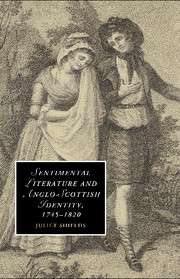Book contents
- Frontmatter
- Contents
- Acknowledgments
- Introduction: The politics and sentiments of union
- 1 The Ossian controversy and the racial beginnings of Britain
- 2 British masculinity and Scottish self-control
- 3 Sentimental correspondences and the boundaries of British identity
- 4 National tales and the domestication of the Scottish Highlands
- 5 Rebellions and re-unions in the historical novel
- Notes
- Bibliography
- Index
- CAMBRIDGE STUDIES IN ROMANTICISM
1 - The Ossian controversy and the racial beginnings of Britain
Published online by Cambridge University Press: 06 August 2010
- Frontmatter
- Contents
- Acknowledgments
- Introduction: The politics and sentiments of union
- 1 The Ossian controversy and the racial beginnings of Britain
- 2 British masculinity and Scottish self-control
- 3 Sentimental correspondences and the boundaries of British identity
- 4 National tales and the domestication of the Scottish Highlands
- 5 Rebellions and re-unions in the historical novel
- Notes
- Bibliography
- Index
- CAMBRIDGE STUDIES IN ROMANTICISM
Summary
Adam Smith's The Theory of Moral Sentiments defines sensibility as “exquisite fellow-feeling.” This capacity to share imaginatively in another's feelings, Smith contends, is a product of historical progress and a symptom of enlightened civilization. Only in flourishing commercial nation-states like eighteenth-century Britain might women and men enjoy the security and prosperity necessary to cultivate their own finer feelings, let alone to attend to the feelings of other people. Less than a year after the publication of the first edition of The Theory of Moral Sentiments, James Macpherson completed his Fragments of Ancient Poetry (1760), a collection that he represented to readers as his English translations of Gaelic songs composed by the third-century Celtic bard, Ossian, and transmitted orally across generations to eighteenth-century Scottish Highlanders. The immense popularity of the Fragments encouraged Macpherson to produce translations of Ossian's epics, Fingal (1761) and Temora (1763). Widely suspected to be Macpherson's own creations, these poems, which in 1765 were published together with a slew of dissertations, prefaces, and textual commentary as The Works of Ossian, offered a counter-narrative to Smith's history of sensibility in The Theory of Moral Sentiments. Macpherson depicted an ancient Celtic society that, uncorrupted by false appetites and affected manners, exhibited a refined sensibility and a chivalric martial valor unparalleled in enlightened commercial Britain.
From the moment of the Fragments' publication, critical discussions of Ossian perhaps inevitably have been dominated by the issue of authenticity, the question of whether Macpherson did in fact translate, or even loosely adapt, third-century Gaelic originals.
- Type
- Chapter
- Information
- Publisher: Cambridge University PressPrint publication year: 2010



